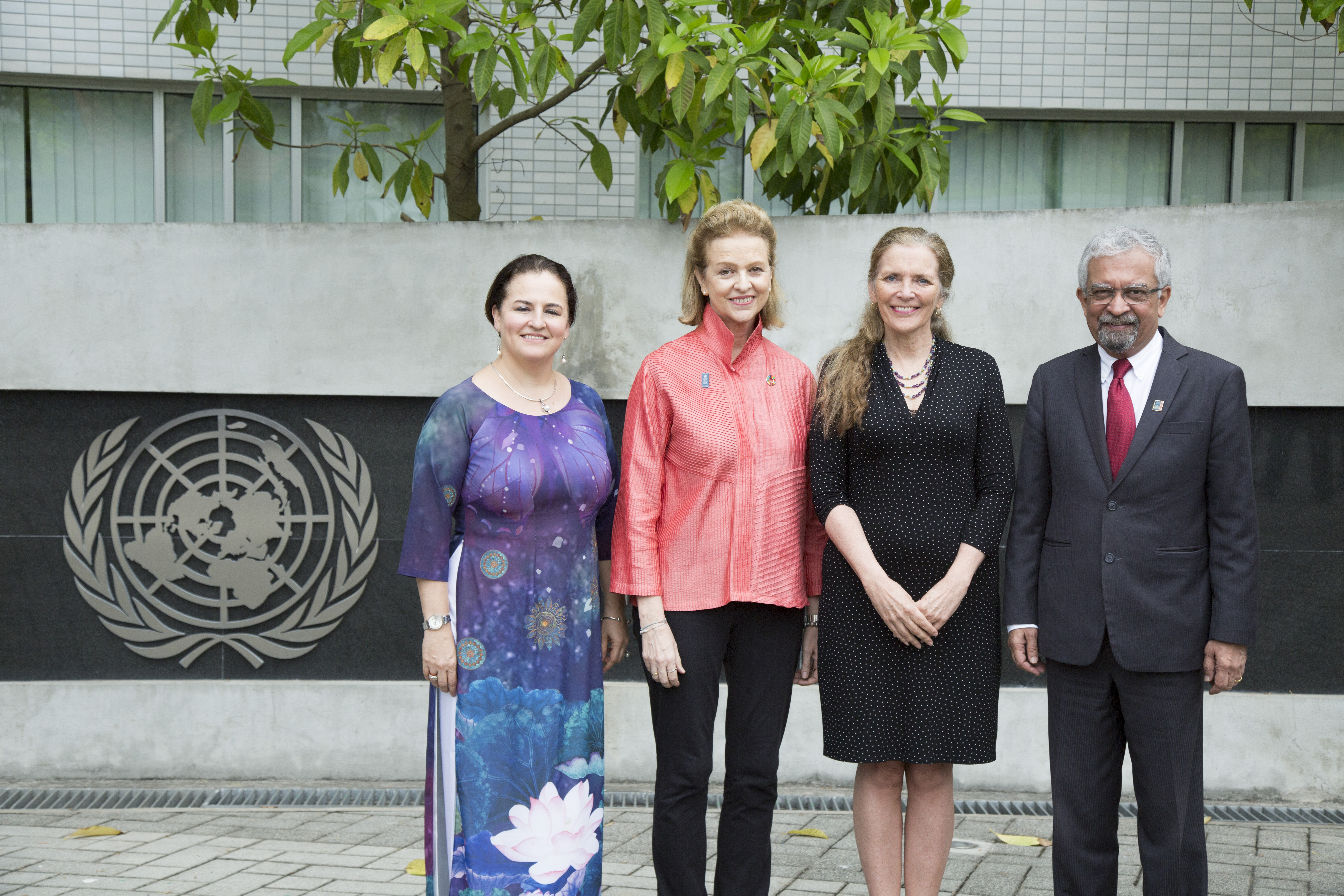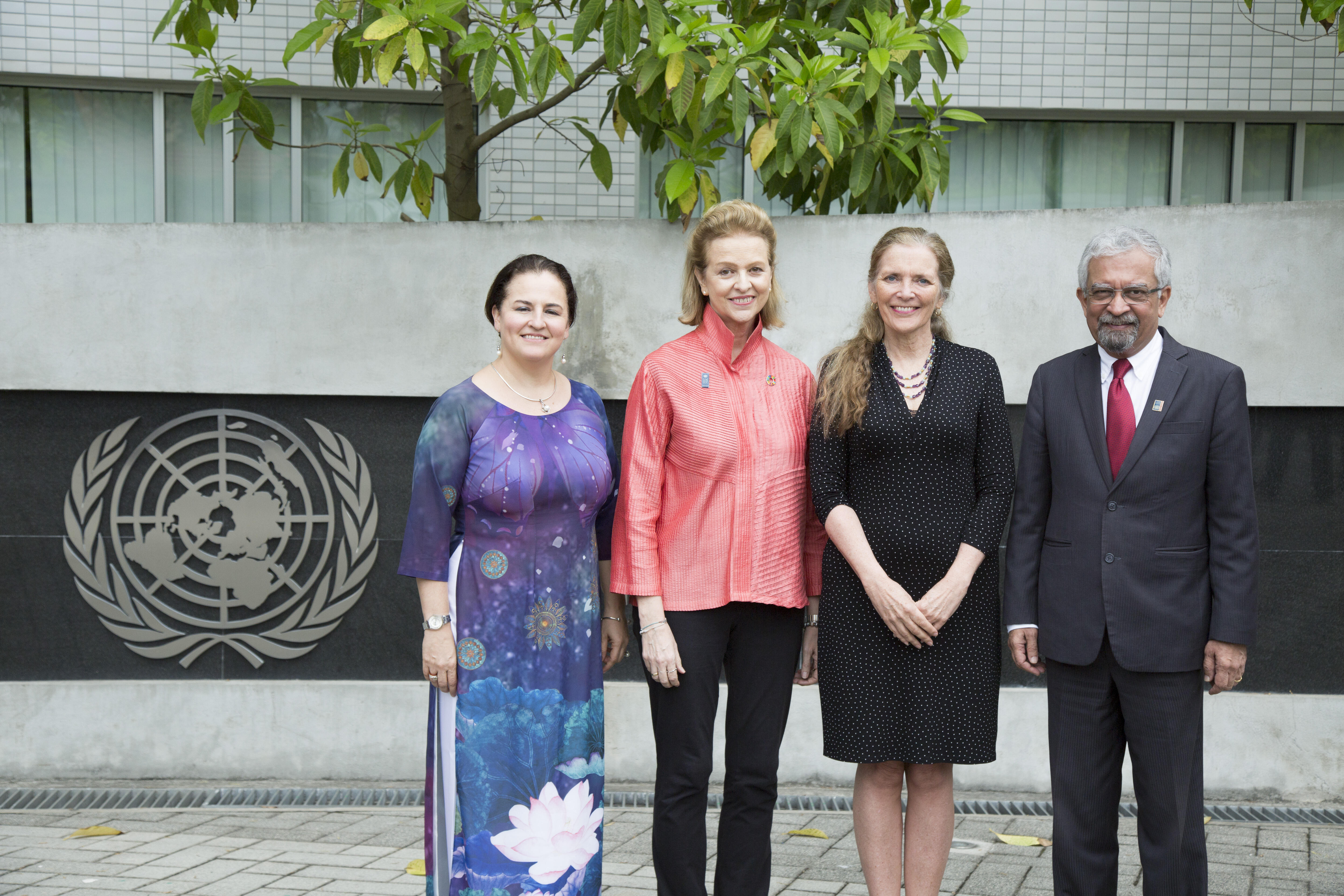Written by United Nations Resident Coordinator Kamal Malhotra and four heads of UN agencies in Viet Nam: Elisa Fernandez (UN Women), Astrid Bant (UNFPA), Michael Croft (UNESCO) and Caitlin Wiesen (UNDP)

From left to right: Elisa Fernandez (UN Women), Caitlin Wiesen (UNDP), Astrid Bant (UNFPA) and Kamal Malhotra (United Nations Resident Coordinator)
Twenty years ago, Hanoi was awarded the UNESCO City for Peace prize. As we celebrate International Women's Day, now is a good time to look at what a peaceful city means today, in particular for women and girls, and at the many initiatives under way to ensure safety, inclusion and access for all.
Last week, as Hanoi hosted a much-heralded summit between the United States and the Democratic People's Republic of Korea (DPRK), the world's media, residents and the thousands of visitors were reminded of the city's status as an official City for Peace.
In making the 1999 award, the United Nations Educational, Scientific and Cultural Organization (UNESCO) noted the Vietnamese capital's efforts to preserve its cultural heritage and green spaces, its support for education, and its policies for development, all of which contribute to what it called the "establishment of a culture of peace."
But as we celebrate International Women's Day, and in the context of Viet Nam's efforts to achieve its commitments to the global 2030 Agenda for Sustainable Development, we should also take stock of what "peace" means for a city, in terms of creating a society that is safe for all, especially women and girls, and that promotes the access and inclusion of often neglected groups, such as people with disabilities, so that No One is Left Behind – a central pledge of the 2030 Agenda.
Safety for women and girls means, among other things, a life free from violence. In Vietnam as in many other places, women and girls make up the majority of victims of domestic violence, sexual harassment and sexual violence – at home, in the workplace, in public spaces and even in school.
There are many initiatives addressing these challenges. The Safe Cities for Women and Children programme in Ho Chi Minh City, supported by the United Nations Entity for Gender Equality and the Empowerment of Women (UN Women) and city authorities, is working to increase safety in public buses. UN Women and the United Nations Population Fund (UNFPA) are also supporting work in partnership with the Vietnam Women's Union and the Farmer's Union, respectively, that engages young men and boys in preventing gender-based violence. Moreover, these two UN agencies together with UNESCO have been piloting the Connect to Respect toolkit, a collection of exercises and guidelines to help create a safe and respectful learning environment in schools in selected provinces.
Understanding the real prevalence of violence against women and girls requires reliable data. Thanks to the collaboration between the Ministry of Labour, Invalids and Social Affairs, the General Statistics Office, UNFPA and the support of the Australian Government, the results of the Second National Survey on Violence Against Women and Girls will be made available later this year. This survey will help us understand changes from 2010 to 2018, including the effectiveness of policies and programmes.
A city of peace is one that ensures accessibility and social inclusion for all its citizens, including those with disabilities. As of now, most public places, buildings and transport modes have no access facilities for wheelchair users or the visually impaired. Targeted innovations are making a difference here, such as an app, currently being finalized by the United Nations Development Programme (UNDP) and Viet Nam's Disability Research and Capacity Development Center, that will map accessible public places and buildings and enable easier mobility.
The importance of mobility for all cannot be overstated. If women and girls are safe on public transport, it improves their access to educational and economic opportunities. For people with a disability, accessible transport is essential to securing employment and covering their own costs of living. And improvements in accessibility can benefit many other urban residents, notably the elderly.
With all this in mind, we are committed to supporting national and local authorities build peaceful, safe, accessible and inclusive cities of the future. This will translate into several key areas of action:
First, we need to promote the full participation and leadership of women, children, people with disabilities and other vulnerable groups on issues that affect their lives. Second, only good, credible data, broken down by sex, disability and other key characteristics, can reliably inform policies and programmes, as well as assess any progress. Third, authorities should improve coordination and referral between services that span several sectors (for example health, education or the justice system), especially for survivors of gender-based violence. Last but not least, we all have a role to play in addressing the root causes of gender inequality, discrimination and violence, namely by promoting a culture of respect and equality for everyone in all contexts: at home, in schools, at work and in public spaces.


